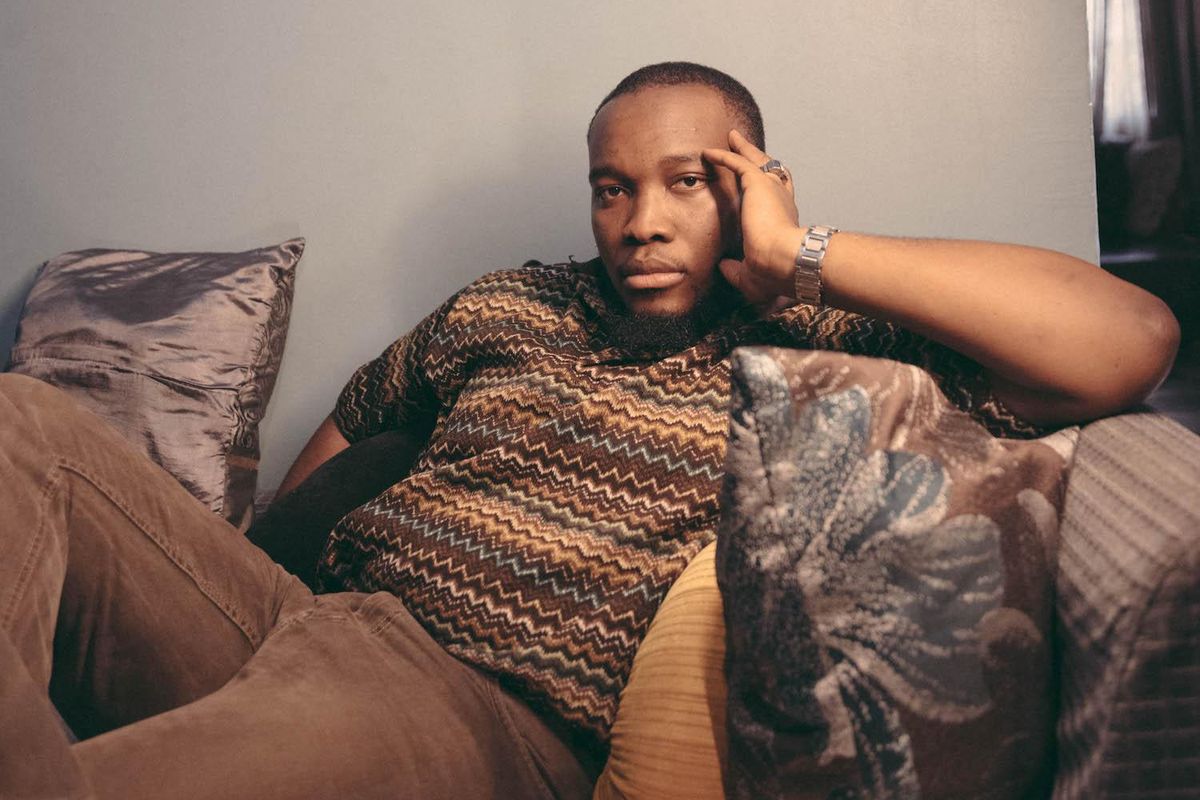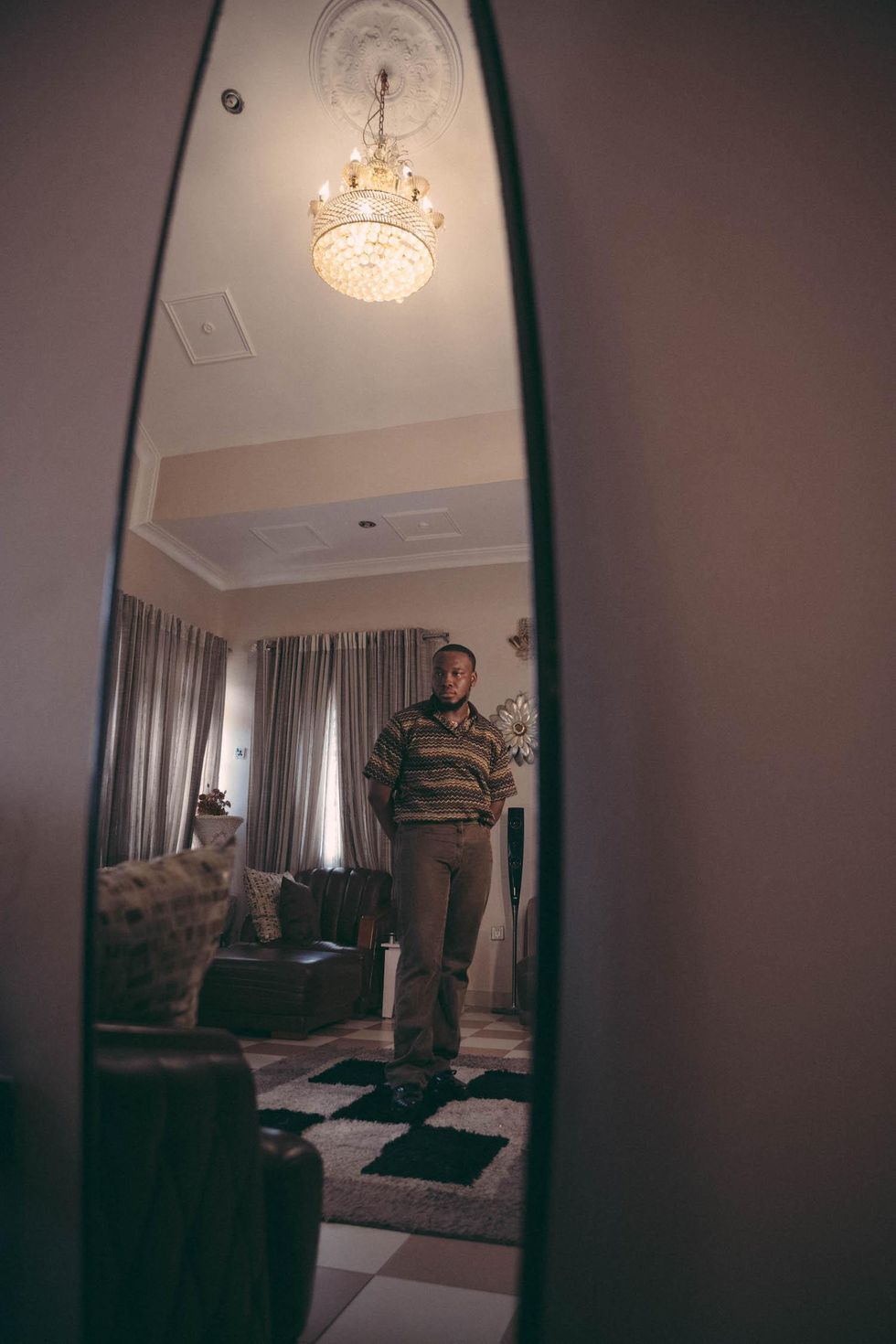Spotlight: Ademola Falomo Is Documenting Nigerian Pop Culture Through Film
From filming important videos in Nigeria's alté history to setting up a hub for independent filmmakers in the space, here is why Ademola Falomo is a custodian of Nigerian pop culture at the moment.

Ademola Falomo.
In our 'Spotlight' series, we highlight the work of photographers, visual artists, multimedia artists, and more who are producing vibrant, original work.
It's said that when a magician performs a trick successfully, he will definitely perform the same trick again. This was the case with Ademola Falomo and Tems. After creating the eccentric visuals for "Try Me," no one else was better to film her music video for "Damages." It's this positioning is exactly what the 24 year-old music video director and creative entrepreneur is particular about.
“I'm a collaborative spirit,” he confesses. “My business model is that I like when an artist sees me and says, ‘Ademola, I like your style of shooting. Let's work on a video.’ The problem with just being a regular video director shooting for multiple artists is that they see you as a means to an end. But if they come to you based on ‘I want this person to shoot my video’, it's because they trust your work. They don't believe any other person can give them that quality of work that they're looking for. That is what I want.”
It's been working for him as, even before Tems, the filmmaker collaborated with the pioneers of Nigeria's alternative music at a time when the work that they did was crucial. Ademola has credits on multiple Santi records, DRB Lasgidi’s
Trouble," and Boj’s "Abracadabra" from 2020 featuring Davido and Mr Eazi to mention only a few.
“Santi's ‘Gangsta Fear.’ That was what introduced me to the alté scene and got me so many other important recognitions. One day, Santi needed a video person and one of my friends showed him a video I shot for a dancer at the time. Santi had just performed a snippet of ‘The Running’ at a club and it went crazy. So he was like ‘oh, bro show me your stuff’ and that was where everything started. It was one of those moments,” he says with the same passion still very tangible in his voice as he speaks.
In this Spotlight interview, Ademola Falomo talks about the growth of filmmaking in Nigeria since he got into the scene, his most cherished career moments, and how he is working so hard to leave an impact on the world.
Responses have been edited for length and clarity.

Photo: Ikechukwu Okonkwo.
Describe your background as an artist and the journey you've taken to get it to where it is today.
Filmmaking for me has been like a transition. I moved from making music to being a photographer, and eventually a filmmaker. My brother is actually a huge influence on my life as well. He went out one day in 2011 and I went to his computer to check out Adobe Photoshop, which he was using to make calendars at that time and I saw where all the other Adobe softwares were. That was where I stumbled on Premiere Pro for video editing and it was the light bulb moment for me. At the time, I really liked music and I was interested in photography too. So I thought of how to merge these two passions and cinematography came to mind. I started out making videos with my phone until Santi lent me a camera and I've been making videos since then.
When was your first major project and what was it?
2018, "Fake ID" by Kah-lo. Kah-Lo is a Grammy nominated singer. It's a big hit song that has been featured on quite a number of Netflix movies.
Between then and now, how would you assess the growth of filmmaking in Nigeria?
This is a very beautiful question. When I first started doing videos, a lot of artists were not using videos as visualisers. That was the moment when people started realizing how effective videos were for marketing. And the idea back then was that we didn't have the greatest cameras, nothing. We just went around Magodo and filmed random cool shots. And looking at the growth of filmmaking since then, it has actually been incredible. Back then, the videos that were being shot mostly only had fast cars, fine women and Àdìré attire. They were not bad, but that's what Nigerians were open to.
But when I first started filming, I was grabbing inspiration from outside Nigeria. We grabbed inspiration from there and merged those ideas with our culture. It was just strange. But we were creative and never thought anything was weird.
So transitioning from there to seeing how people are paying much attention to music videos now, it's like there's been a lot of ground work. I think even the alté community, and even us – people who started doing videos back then – have contributed to that growth.
What do you think is the secret to staying relevant as a music video director in Nigeria?
In Nigeria, I think it's a demand and supply thing. The more you produce work, the more your audience is like ‘ah, here's another video.’ It's the same thing that happens in life. If you're coming around my house too often, after some time, I'll “see you finish." That's the same approach in the music video industry.
I wasn't motivated by money as much. My business style or approach in life is more impact driven. I want to make sure that I leave an impact with what I'm doing. I'll tell you the truth. I got offers to work for mainstream artists, but I turned them down because they weren't aligning with the positioning I had in my head.
Doesn't that reduce the number of videos you have in your catalog?
I always say this: it's not about how much work you churn out but the quality of the work you do. Don't forget that you're working with your brain. You're doing ideas, and your brain needs to relax. If you're doing multiple videos and you're thinking up multiple ideas, after some time, you'll feel burnt out.
What is Family Studio?
I'd actually term Family as a home for indie filmmakers. So while we want to tell stories and all that, the core of the company is more of offering services to fast-rising directors and filmmakers. If you listen to some directors tell their stories, they'll tell you that they had to use their phones to shoot in their early days and stuff. I had to use my phone at one point, but I was opportuned to get a camera to actually test out things I had been watching on YouTube. There are multiple fast-rising filmmakers like that who need to test out things they've been checking online. This is one of the reasons why Family as a company introduced a free camera program where fast-rising filmmakers can just send us an email and get a camera to test out the stuff that they see online.
So what would you describe as your most important project ever?
I think it'll be the project I shot for Paris Fashion Week. That is my most important project because it was about celebrating black culture. And it was amazing that they were to select people around the world and I was commissioned as one of the directors from Africa. Mind you, this was in 2020 during the pandemic.
How has the pandemic affected you creatively?
Only very few people shot videos during the pandemic. But I've always been a person of times and seasons. There's a time for everything and there's a season for everything. The whole world felt like it had stopped and I considered that time to be an opportunity for me to ask myself what was next.
During the pandemic, there wasn't so much money and all that, but I found it as a blessing in a way that I could actually restructure my goals and everything I wanted to do. And that was when ideas like Family were birthed.
What is your creative process like?
It depends on what particular project it is. For different projects, there's different processes. Let's use a music video for example. I get the song, listen to it for like a million times, go check the artist on social media and I just check to see what type of branding they have and how I could better portray them through the video.
And the reason I have always had this form of thinking is because the guys I started working with – Odunsi, Santi and the likes – have always been very huge on branding and how they are perceived. Then I get inspired by things ranging from the title of the song, to a word in the lyrics, to my immediate environment or an experience I am having.
In what new ways do you plan to express your creativity beyond making videos?
I see myself as an artist. So I will most likely be doing exhibitions at some point, where I'll probably show stills from videos I have worked on in collaboration with the DOPs I've worked with. Also, I think in the next couple years, I'll probably focus more on supporting indie filmmakers in Africa. I feel that is my sole purpose. That is exactly what I want to do with my life.
- The 20 Best Nigerian Songs of 2020 - OkayAfrica ›
- How Women Are Becoming Decision Makers In Nigerian Music ... ›
- The 20 Best Nigerian Songs of 2022 So Far - OkayAfrica ›

